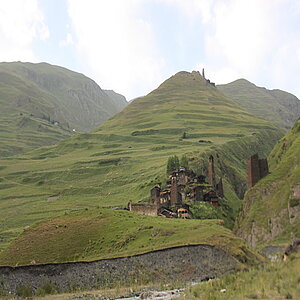IKI supports cooperation between Central Asia countries

The ‘Nexus’ approach aims to stimulate shared measures on climate change mitigation and sustainable resource usage within the region.
In terms of climate change and unsustainable resource use, the situation in Central Asia has reached critical mass, with the region now threatened by serious economic, developmental and environmental losses. The populations in the region are increasingly exposed to these risks. Since the impacts are not limited to any one country, regional cooperation based on mutual trust is an essential part of the solution here.
Unevenly distributed resources
Disparities are taking shape between the countries in Central Asia in terms of the distribution of arable land, water resources, fossil fuel deposits, climate and topography. While upriver countries have adequate water resources but are energy-poor, downriver countries mine fossil fuels and have high levels of agricultural production, but depend to a high degree on their water-rich neighbours to meet their demands and the needs of their agricultural sectors.
Over the next few decades, a population growth of 30 percent has been modelled for Central Asia, with its roughly 75 million inhabitants in 2021 rising to 100 million in 2050. Projected trends in urbanisation and economic diversification will also exert additional pressure on the demand for natural resources. At the time of the Soviet Union, a number of inequalities were balanced out by centralised planning, with energy and water being distributed evenly at uniform rates – although at the price of environmental destruction at the point of origin. With the collapse of the Soviet Union and the independence of Central Asian states in the early 1990s, questions of distribution were transformed overnight into cross-border challenges. To the present day, this restoration of national boundaries has presented serious obstacles to the regional management and distribution of water and energy resources.
The Nexus approach
The word ‘nexus’ comes from Latin and means a relationship, interconnection or linkage. Accordingly, the Nexus approach focuses on the shared use of resources and assets in the fields of energy, water and land use, as well as shared strategies for the management of risks and conflicts. The approach transcends traditional sectoral thinking, aiming instead to achieve a comprehensive level of security and sustainability in resource use. The strategy is also based on research findings showing that energy, water, agriculture and natural ecosystems are closely linked to one another, and that a sectoral approach does not consider the impacts of measures on other sectors and therefore produces imbalances. Studies have also shown that a higher level of regional cooperation in the energy sector could bring in additional income of USD 0.5 to 6.4 billion per year for Kazakhstan, Kyrgyzstan, Tajikistan and Uzbekistan.
The Nexus approach can provide support to governments for identifying cost-effective and inclusive solutions for a low-carbon transformation of their energy systems while also mitigating the stress placed on water resources. This strengthens the resilience of regional populations, ecosystems and assets versus the negative impacts of climate change.
Nexus approach initiatives
Over the last three years, there have been several joint campaigns, projects and initiatives in the context of the Nexus approach. One of these was the ‘Green Central Asia’ conference held in Berlin in January 2020, whose delegates adopted a motion announcing cooperation between Central Asian countries and Afghanistan in the fields of climate and security.
The International Climate Initiative (IKI) has also provided support for implementing the Nexus approach at a senior policy-making level with its project ‘Developing capacities for climate policy in Southeast and Eastern Europe, South Caucasus and Central Asia’.
This project was preceded by encouraging a trust-building, peer-based culture of dialogue between all Central Asian partners, as well as taking a detailed look at the challenges and opportunities involved in cross-border cooperation in the water, energy and climate sectors, and in food security. This policy dialogue was planned and implemented by the Organisation for Economic Co-Operation and Development (OECD).
In June 2021, an initial expert workshop was held, titled ‘Benefits of regional cooperation on the energy-water-land nexus transformation in Central Asia’. This was followed in October 2021 by a policy dialogue, with the participation of high-ranking representatives from Kazakhstan, Kyrgyzstan, Tajikistan, Turkmenistan and Uzbekistan. This event was also attended by the Asian Development Bank, the European Bank for Reconstruction and Development (EBRD), the United Nations Food and Agriculture Organisation (FAO) and the World Bank.
The aim was for delegates to share experiences and strengthen dialogue about the obstacles and opportunities for cooperation in fields of energy, water and land use in Central Asia. As a starting-point, the OECD had prepared a discussion paper, which investigated the interrelationships between these fields for individual countries in the Central Asia as well as regional links, while gathering insights and opportunities for cooperation between these states. This discussion paper was then revised and published following the policy event.
IKI project to promote long-term cooperation
The IKI project ‘Developing capacities for climate policy in Southeast and Eastern Europe, South Caucasus and Central Asia’ establishes a framework for integrated planning and improved cooperation at both national and regional level, and therefore helps to ensure that regional dialogue and measures seeking to support the long-term, sustainable use of energy and water resources continue to form part of regional programmes.
The successful work will be continued with the IKI project Regional mechanisms for the low-carbon, climate-resilient transformation of the energy-water-land Nexus in Central Asia.
The link has been copied to the clipboard
Contact
IKI Office
Zukunft – Umwelt – Gesellschaft (ZUG) gGmbH
Stresemannstraße 69-71
10963 Berlin
Further information
Benefits of regional co-operation on the energy-water-land use nexus transformation in Central Asia
IEEE: The Development of a Risk Assessment Modeling for the Power System of Kazakhstan
World Bank Group: Enhancing Regional Power Trade in Central Asia









![[Translate to English:]](/fileadmin/_processed_/1/9/csm_20231120_eroeffnung_klimabuero_GIZ_Gate_Agency_443014c5e2.jpg)




